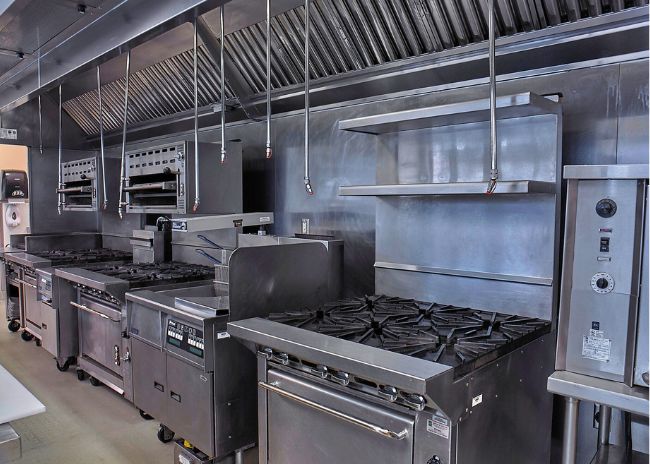 Extend your equipment life, help ensure food and employee safety, and save energy by partnering with Smart Care.As the summer season approaches, it's essential to ensure your commercial foodservice equipment is in top condition to handle the increased demand that comes with warmer weather. Proper maintenance and preparation can help prevent equipment downtime, reduce maintenance costs, and ensure the safety of your staff and customers. In this guide, we will discuss a few key steps to help you gear up for summer and keep your commercial foodservice equipment running smoothly.
Extend your equipment life, help ensure food and employee safety, and save energy by partnering with Smart Care.As the summer season approaches, it's essential to ensure your commercial foodservice equipment is in top condition to handle the increased demand that comes with warmer weather. Proper maintenance and preparation can help prevent equipment downtime, reduce maintenance costs, and ensure the safety of your staff and customers. In this guide, we will discuss a few key steps to help you gear up for summer and keep your commercial foodservice equipment running smoothly.
Assess and Address Refrigeration Units
As summer temperatures rise, the efficiency of your refrigeration units becomes paramount in preventing spoilage and ensuring food safety. Start by conducting a thorough examination of your refrigerators and freezers for any physical damage or operational inconsistencies. Focus on the gaskets for signs of wear, which could compromise the seal and efficiency of the unit. Cleaning the condenser coils is also essential, as dirty or blocked coils can significantly hinder the performance of your refrigeration equipment by forcing it to work harder, leading to increased energy consumption and premature failure. Temperature regulation is another critical aspect; ensure the settings are optimal to keep food fresh without overburdening the system. Addressing these factors before the summer rush can prevent costly downtime and preserve the integrity of perishable goods.
Inspect and Maintain Cooking Appliances
The uptick in demand for popular seasonal dishes can put added pressure on your kitchen's cooking appliances. To ensure they're up to the task, a comprehensive inspection and maintenance routine is crucial. Start by meticulously checking for any signs of gas leaks, which not only pose a safety risk but can also impair the efficiency of your equipment. Wear and tear on parts is inevitable, so identify and replace any that are worn out to prevent malfunctions during peak times.
Attention to detail is vital when examining fans, burners and heating elements. Confirm each component is in optimal working condition to guarantee even cooking temperatures and energy efficiency. Regular cleaning is non-negotiable; it prevents the accumulation of grease and debris, which are common culprits behind kitchen fires and can hinder the performance of appliances. This step not only safeguards against potential hazards but also contributes to a more harmonious operation during the bustling summer months.
Prepare Ice Machines for Peak Performance
Ice machines play a pivotal role in ensuring that food and beverages remain chilled throughout the sizzling summer months. A thorough approach to maintaining these units is crucial to their efficiency and longevity. Begin by thoroughly cleaning and sanitizing the interior components of your ice machines to eliminate any bacteria or contaminants that could impact ice quality. This process should extend to the ice storage bins, where routine checks for signs of biofilm and buildup are imperative.
Additionally, inspecting the water filtration system is a key step in this maintenance regimen. A clean filter will prevent mineral buildup and ensure the ice produced is clear, taste-free, and odorless. Black specks in your water or ice can be signs of a broken water filter. These little specs are food-grade pieces of activated charcoal typically made from coconut husks. Replacing or cleaning water filters as recommended by the manufacturer can significantly improve the performance of ice machines and reduce the need for more frequent cleanings. As a best practice, be sure an installation or replacement date is present on any water filter in your building.
Next, evaluate the water supply lines for any signs of leakage or obstruction. A consistent and uncontaminated water supply is essential for the optimal functioning of ice machines. Any issues here can lead to inefficient ice production or may damage the machine over time.
Lastly, ensure the surrounding environment is conducive to the ice machine’s operation. Avoid placing the unit in direct sunlight or near heat-producing equipment, as excessive ambient temperatures can strain the machine’s cooling mechanisms, leading to decreased ice production and increased energy consumption.
Implement a Preventative Maintenance Schedule
Establishing a structured preventive maintenance plan is crucial for the seamless operation of your commercial foodservice equipment. Smart Care's comprehensive preventative maintenance and repair services are tailored to efficiently meet these needs, helping to reduce operational costs. Don't let maintenance issues disrupt your summer operations—partner with Smart Care today and ensure your commercial foodservice equipment stays up and running at peak performance year-round.



